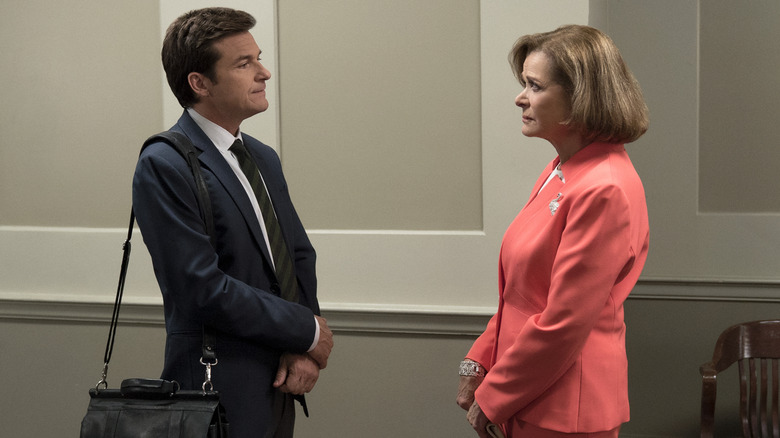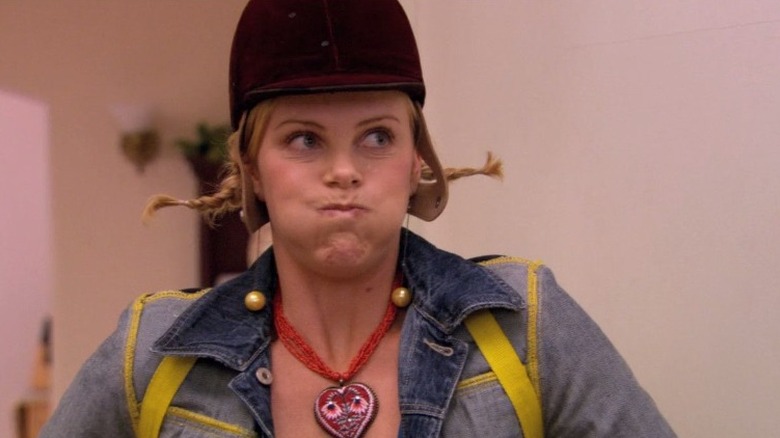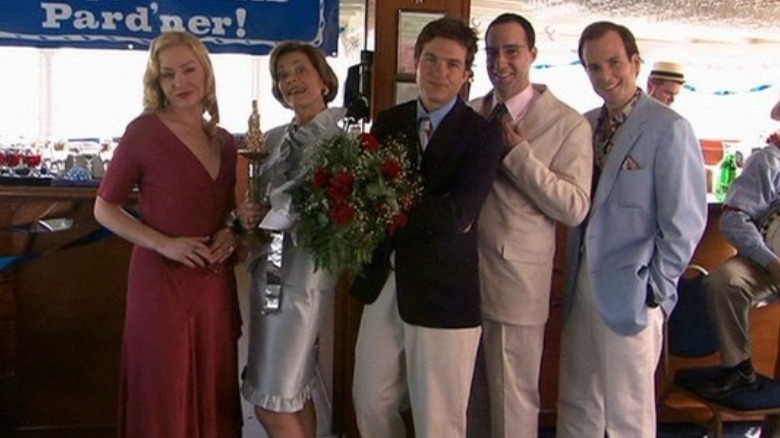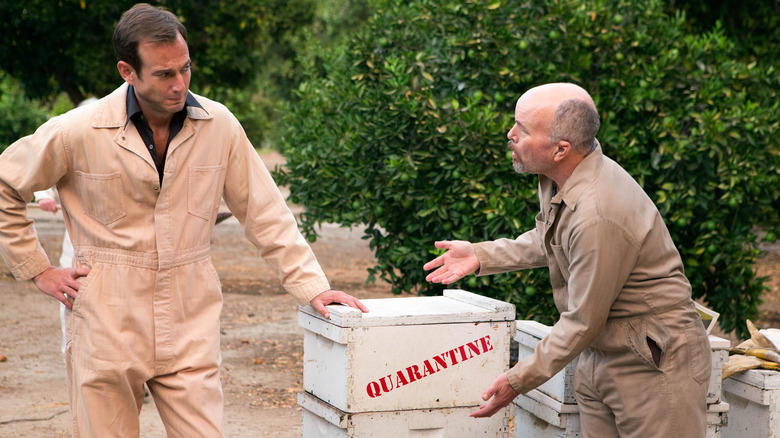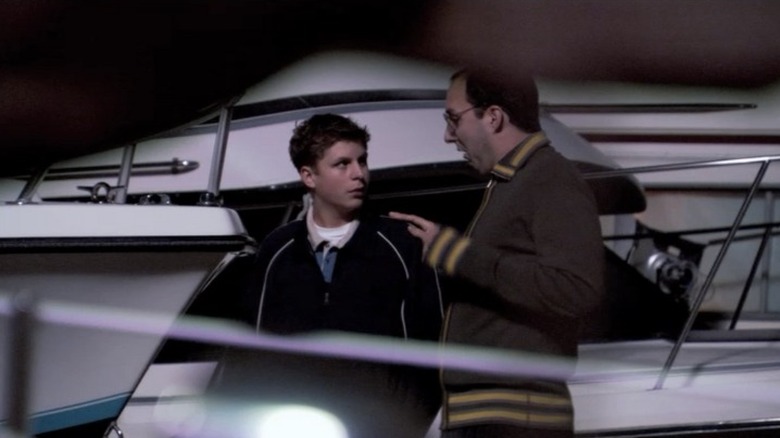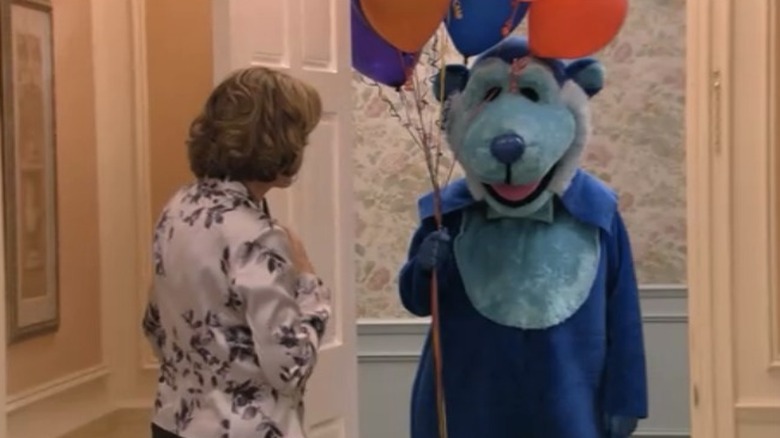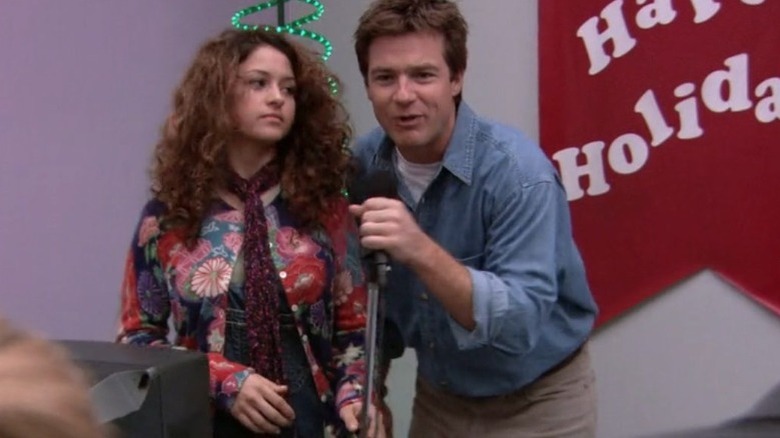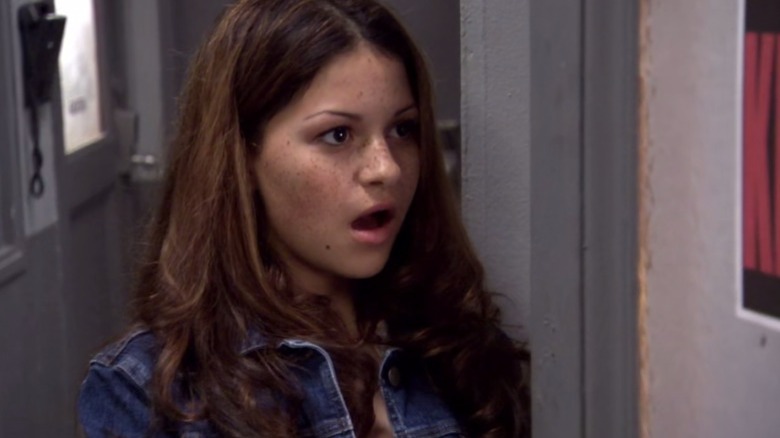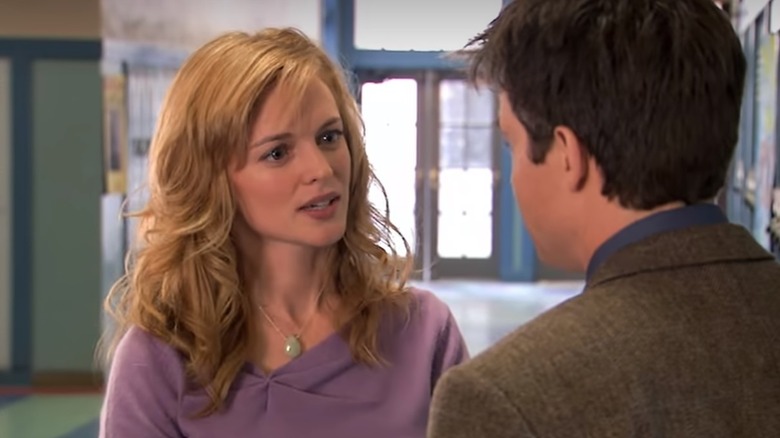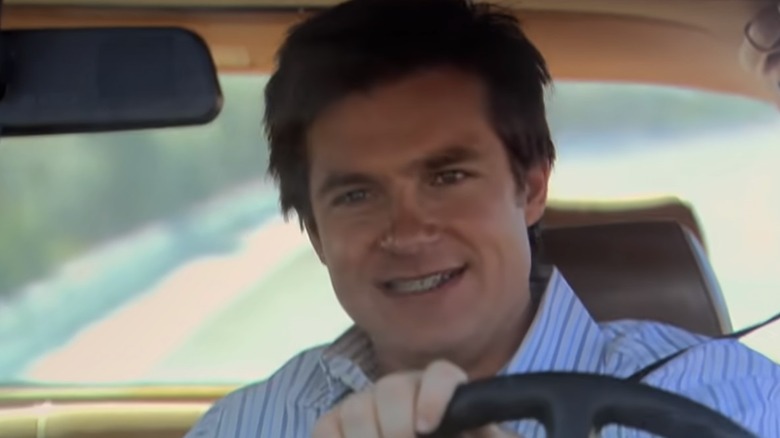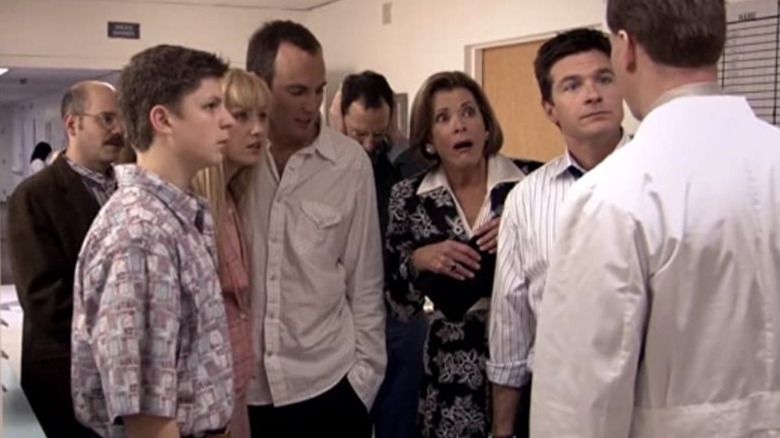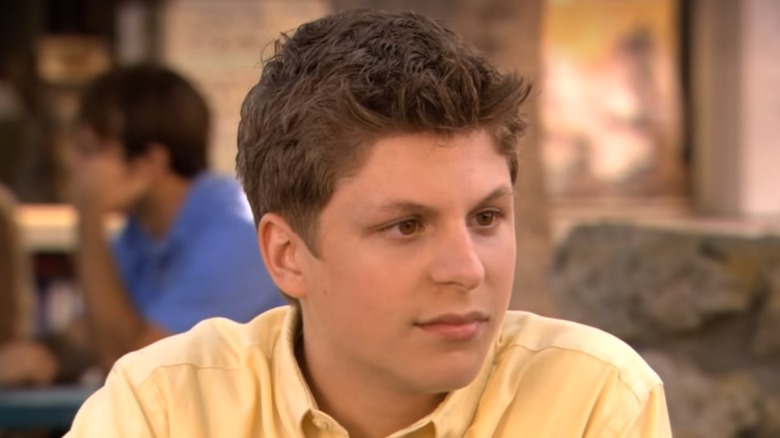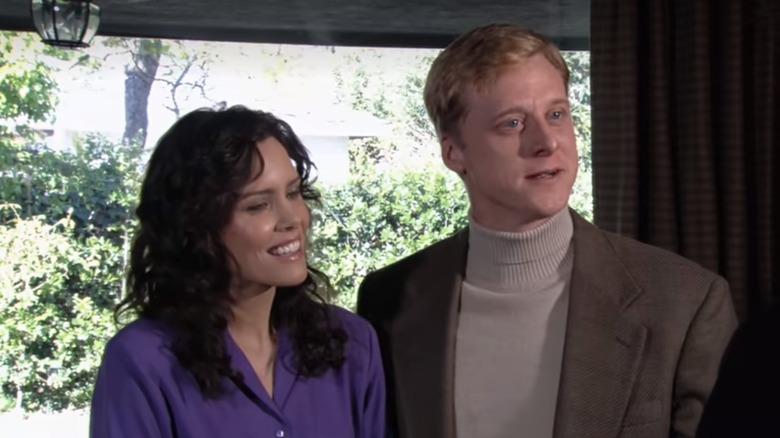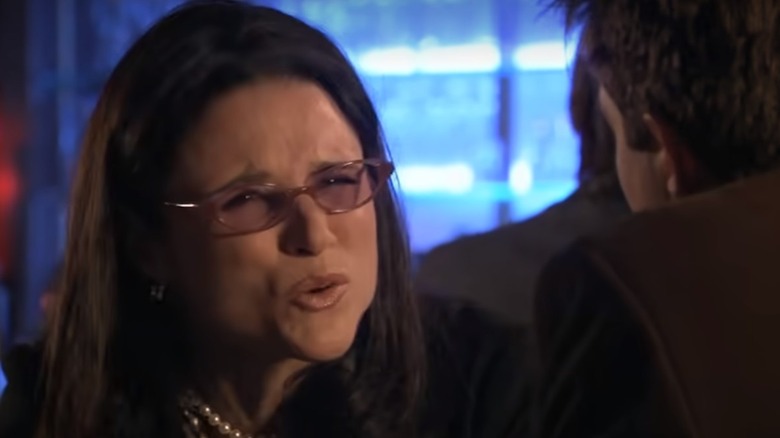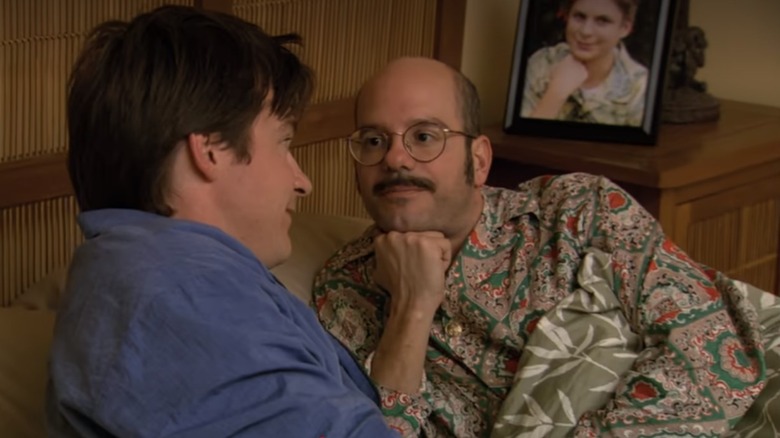The 14 Best Episodes Of Arrested Development Episodes, Ranked
"Arrested Development" is one of this century's most infamous television cancellations. It lives in the canon of "gone too soon" television history alongside the likes of "Freaks and Geeks" and "Firefly." Well, at least it did for a while. Netflix notably revived the series, debuting a new season in 2013. A fifth and final season was produced and aired in 2018, solidifying the enduring struggle with getting new episodes of the Bluth family and their incredulous hijinks.
Jason Bateman portrays Michael Bluth, the middle son in a family of ridiculous, wealthy ne'er-do-wells. His father, George Bluth Sr. (Jeffrey Tambor), faces imprisonment due to committing several financial crimes. While Michael tries to extricate himself from his family repeatedly, they routinely draw him back into the fold. Modern television series like "Schitt's Creek" play with the earnest pathos of an uber-wealthy family and their fall from grace. However, "Arrested Development" distinguished itself first with a primary interest in letting these characters be as bad as possible — like a contemporary "Seinfeld" where no one learns a lesson. Defined by its Ron Howard monologues, running gags (cousin love, never nude, the banana stand, onward and onward), and committed cast, "Arrested Development is a comedy classic. Narrowing a show this exceptional to the best 14 episodes isn't easy. But within a remarkably great series history, these episodes best encapsulate why the comedy of "Arrested Development" endures.
14. Mr F
Admittedly, the Mr. F affair in "Arrested Development" might be considered one of the show's weakest plot threads. As outrageous as the show had been in the past, season 3 was on a completely different planet. A core component of that is the "Mr. F" debacle. Believing there's a mole in the company (or family) going by the name Mr. F, Michael endeavors to reveal their identity. His quest leads him to Wee Britain, a British-themed neighborhood in Orange County. There, he meets Charlize Theron's Rita, and the two become infatuated with one another. Unfortunately, Michael doesn't know Rita, who he presumes to be simply young at heart, has an intellectual disability.
While the show isn't as graceful with its handling as it had been with other sensitive topics, Theron does a lot of heavy lifting. The interplay in "Mr. F" does a lot to remedy the show's brief, perhaps ill-advised, foray into Wee Britain. The physical gags are outrageous — like a tiny town is destroyed by a Kaiju, and Tobias (David Cross) mistakes the CIA for the CAA (Creative Artists Agency). There's so much good stuff crammed into so little time! "Mr. F" sees "Arrested Development" return to its roots of being as funny as possible first and foremost.
13. Pilot
Most shows struggle to identify themselves right out the gate. While many series later show promise, exposition, character introductions, and attempts at solidifying context and plot (often) weigh down early seasons. However, "Arrested Development" knew what it was from its pilot episode.
In season 1, episode 1, Michael Bluth is furious with his father for refusing to give him a long-awaited promotion. At a retirement party aboard a boat, Michael becomes frustrated to see his mother, Lucille (the late and unmatched Jessica Walter), receive it instead. So, Michael commits to leaving his family for good. He has a son, George Michael (Michael Cera), to think about after all.
The writers handle the characters' collective absurdity with aplomb. Lucille's one-liners are caustic and hilarious, and everyone — whether it be Will Arnett's Gob Bluth, David Cross' Tobias Fünke, or Portia de Rossi's Lindsay Bluth Fünke — has a moment to shine. There is no ambiguity, no struggle for audiences to connect these characters to their ethos. From the start, the comedy, dynamics, and irreverence feel realistic. "Pilot" is a remarkably accomplished premiere and one that springboards into better, funnier things.
12. Colony Collapse
The later seasons of "Arrested Development" fail to match the success of the show's initial run. An older cast, shifting comedic sensibilities, and (most damningly) the lack of cast cohesion account for the show's lackluster return. Reportedly, the series had some actors shoot scenes alone and then edited them into the series' group shots, which sacrificed the key interplay that makes the show work. While its actors remain uniquely talented, "Arrested Development" isn't "Arrested Development" if everyone isn't together.
Luckily, Gob Bluth was there to save the day. In "Colony Collapse," Gob gets his opportunity for an "Arrested Development" solo outing, objectively the strongest showing in the show's Netflix revival. Gob is uniquely capable of carrying an episode as his brand of humor tethered the least to character reactions. Remarkably funny and featuring a career-best Arnett, "Colony Collapse" is a short-lived reminder of what "Arrested Development" once was.
11. Pier Pressure
The structure of "Arrested Development" thrives on the interconnectedness of its ostensibly disparate plot threads. Like "Seinfeld" did remarkably well, "Arrested Development" piles its comedy until everything fuses into a fantastic buffet of comedic ascendant meaning. With "Arrested Development," jokes build on jokes, and "Pier Pressure" introduces a thread the show would return to several times.
Growing up, George Sr. was infamous for his outrageous lessons — including faking a severed arm to teach his children to always leave a note. While Michael rejected his father's lessons, he developed one for his son after suspecting George Michael of marijuana use. Throughout this episode, B-threads intersect beautifully. Watching J. Walter Weatherman (Steve Ryan) ridiculously teach lessons never grows old. It's one of the show's more chaotic episodes. Still, it miraculously remains grounded in the deadpan, minimally absurd humor it does best. While it lacks the legacy status of later episodes, it's incredible to see how fleshed out the show was 10 episodes into its run.
10. Amigos
In "Amigos," George Sr. is hiding away in Mexico. Well-regarded among the populace for his dangerous Cornballer (given as an excellent callback), George Sr. has been skirting the law across the border. Resultantly, Michael travels to Mexico alongside Ann (Mae Whitman) and George Michael. Chaos ensues. Gob, for his part, hires a bounty hunter (an excellent Malik Yoba) to track Michael. Lindsay and Tobias continue to cultivate an open relationship, and Buster (Tony Hale) ostensibly flees to Mexico (really, he ends up down the street).
What marred later seasons of "Arrested Development" is its lack of cohesion. Throughout "Arrested Development" season 4, the cast rarely had a chance to perform together due to their conflicting schedules. Many of season 4's episodes track individual and disparate threads — something that changed in the season 4 remix of "Arrested Development." The show's distinct brand of humor works best when everyone is together. Luckily, "Amigos" has everyone together lots! In this episode, comedy flows freely. While it remains a low-stakes episode, it's a delightfully contained exercise in chaos.
9. Afternoon Delight
In "Afternoon Delight," Lucille rams her car into the famous banana stand, hitting Tobias and trapping Gob inside. Additionally, there's a chaotic Christmas party. Lucille blares her personal protection horn everywhere she goes, and Maeby (Alia Shawkat) becomes increasingly self-conscious about her "thick arms." It's a dynamite half-hour, pulling at previous threads — a theme the show does well — and allowing them to coalesce into something truly spectacular.
While it's stronger than past episodes — due to the familiarity with the cast's distinct brand of humor — it also feels low-stakes. Like "Amigos," it's remarkably contained — and very funny — but it prioritizes comedy over genuine stakes or narrative progress. Granted, "Arrested Development" isn't necessarily the kind of show that needs that much forward momentum. But "Arrested Development" does prioritize subversion and twists more than most. As a standalone, "Afternoon Delight" is, well, a delight, capping with a remarkably meta-awareness of what the titular song means. However, as part of the show's larger canon, it isn't as strong as some of its peers.
8. Not Without My Daughter
Alia Shawkat is one of "Arrested Development's" quietest strengths. A comedy powerhouse even today (check out "Search Party" for proof), Shawkat's Maeby Fünke spends most of "Arrested Development" on the sidelines. But she runs with B-plots that cover everything from getting her parents to separate to working as an underage producer under Jeff Garlin's stewardship. It's remarkable how grounded Shawkat keeps even the most outrageous plot lines. In "Not Without my Daughter," she's allowed to go toe-to-toe with some of Hollywood's big league players.
Notably, Jason Bateman and her have an indelible dynamic, building off of one another remarkably well. As the show's two deadpan players, it's incredible how much zest their interplay yields. Michael, no longer comfortable with parading George Michael around as his daughter as a longstanding "Bring your daughter to work day" joke, opts to take Maeby. He hopes their time together will cultivate a strong sense of work ethic and responsibility in her — something she lacks from her two parents. Judy Greer's Kitty is still missing, with the police suspecting she's met with foul play (she hasn't). Maeby is an essential player in getting Michael off the hook. It's a showcase for Shawkat more than anything. In truth, that is enough to elevate its placement here.
7. Shock & Aww
Unlike other shows of its ilk, "Arrested Development" was careful with its doling-out guest stars. Make no mistake, though. When "Arrested Development" swung, it swung hard, pulling no punches when it came to casting A-listers in guest roles and giving them something of substance to do. "Shock & Aww" sees Michael falling for George Michael's new teacher, Beth Baerly (Heather Graham). Past threads collide, including Gob's insistence on stealing every woman Michael dates away from him as revenge for Michael's affair with Gob's ex, Marta (Patricia Velasquez). (Remember, these aren't necessarily good people.)
George Michael, unfortunately, also harbors a crush on Beth. Curiously, she harbors an intense admiration for Saddam Hussein, remarking that she loves him, prompting George Michael to make her a collage of Saddam as a testament to his love. It's absurd, augmenting some recurring gags — including George Michael's suspicions that his aunt wants to sleep with him. It's an incredibly contained half-hour, abounding with wickedly sharp jabs and jokes. It's nearly awe-inspiring but it lacks the sharp focus or propulsion of later episodes. But as a standalone, it's an absolute romp.
6. The One Where Michael Leaves
Michael is always trying to leave. Of course, he never can. But Michael Bluth does try harder than most to extricate himself from his family. With George Sr. on the lamb, Michael — as next in line in the company's hierarchy — remains the only viable option for prosecution. George Sr. fled, knowing that would happen to Michael. Within the "Arrested Development" ethos, Michael arguably emerges as the most sympathetic — even if most of his foibles, in some capacity, are self-induced.
"Arrested Development" premiered a critically acclaimed season 2, featuring an assemblage of guest stars — including the uproarious Henry Winkler as Barry Zuckerkorn, an attorney who makes Julia Louis-Dreyfus' Maggie look like a godsend of legal know-how. Season 2, episode 1 features outrageous reveals like an ostensible contract with George Sr.'s and Saddam Hussein's signature. (Keep in mind that "Arrested Development" premiered in 2003. Even today, some of its comedy would be subversive for a network sitcom.) That "The One Where Michael Leaves" doubled down on what made "Arrested Development" so funny and transgressive is worth celebrating. By season 2, the show is coming into its own, elevating episodes like this one, which is somewhat constrained (though only a little) by exposition.
5. Let 'Em Eat Cake
"Arrested Development" never has any qualms recognizing just how awful the Bluth family is. Whether through Ron Howard's meta-textual narration or the sheer lack of character growth, the Bluth family remains as incorrigibly endearing and self-involved as ever by the end of season 1. The aptly titled "Let 'Em Eat Cake" episode sees George Sr. suffering a heart attack while the family remains embroiled in petty squabbles. Maeby is jealous of George Michael. Lindsay is, once again, committed to leaving Tobias, and Buster is still fighting with Annyong (Justin Lee), the Korean child Lucille adopted to spite him.
It's a lot! The season 1 finale concludes with another appearance from Ian Roberts' Dr. Fishman, a "very literal" doctor. Dr. Fishman informs the family they've lost George Sr. Presuming he's died, they're shocked to learn he's literally lost — as he escaped through a window. Seeing the Bluths in the throes of whatever grief looks like for them is incredible. Also, it's a great jumping-off point to a much stronger season (hard as it is to believe). "Let 'Em Eat Cake" does a lot right. So much of season 2 is contingent on the foundation laid here. With dangling threads and unresolved conflict, "Let 'Em Eat Cake" practically begs the audience to return for season 2.
4. Good Grief
"Good Grief" features several beats referencing the classic "Peanuts" comic strip. As the title suggests, every key player in grieving. Maeby wants emancipation, George Michael gets dumped, and George Sr. is (mistakenly) announced as dead — ostensibly killed in a Mexican prison. The show depicts their grief by showing them walking sullenly with their heads low with the piano tune from "Christmas Time is Here" playing as they do. It's so dumb and so out there. Still, it works as one of the early aughts' most inspired comedic beats.
Elsewhere, "Good Grief" has more Lucille (never a bad thing) being a menace to everyone and everything around her. Lindsay dons her red "Slut" t-shirt again. And, in a bit of comedy that never fails, explicit curse words are censored. Plus, it features another iconic gag. Michael, not ever recognizing what George Michael sees in ex-girlfriend Ann (Mae Whitman), incredulously refers to her as "her?" It's one of the show's longest-running gags, and any episode that features it deserves a special shout-out. As a latter-season episode, it's remarkably confident, doubling down on the familiarity some earlier episodes lacked.
3. Meet the Veals
Seriously, her? In "Meet the Veals," George Michael falls into a pre-engagement craze. For anyone who might not know, there was a period in the early aughts — reaching its peak with the Jonas Brothers — where young people were making promises to one day marry their partner. Encapsulating the full breadth of purity rings, promise statements, and pre-engagements, 14-year-olds were dedicating their lives to high school partners. George Michael and Ann intend to get pre-engaged. Michael, in a brief bout of wisdom, intends to shut it down.
Michael meets Ann's parents, the Veals, wonderfully played by Ione Skye and national treasure Alan Tudyk. Mrs. Veal isn't the beacon of purity their daughter is. Mrs. Veal kisses Michael, and misunderstandings ensue. "Meet the Veals" is a standout episode because it briefly sees the Bluths behaving normally. While Michael introduces the Veals to his family with the intent of turning them off, he finds everyone at Lucille's apartment acting normal. The episode's juxtaposition works well, elevating "Meet the Veals" above the rest of season 2. It's the season's strongest showing.
2. Justice is Blind
C'mon, it's Julia Louis-Dreyfus! That's all that needs to be said. While preparing for his father's court case, Michael begins a relationship with Maggie (Louis-Dreyfus), the lead attorney for the prosecution in the case against his father. They sleep together often, though, in a past episode, Michael discovers she is blind. At first, he endeavors to take advantage of the opportunity to help his family, but his guilt ricochets. But Maggie isn't blind: it's a ruse she uses to generate sympathy in the courtroom.
Louis-Dreyfus has 11 Emmys and 26 nominations to her name for good reason. A comedy powerhouse, her work on "Seinfeld" translated miraculously to parallel beats in "Arrested Development." The comedy is absurd, sure, but Louis-Dreyfus excels at the intense physical comedy in "Justice Is Blind." It's uproariously funny, never petering out or slowing down for even a second. It's as close to perfect as the show has ever been. Louis-Dreyfus is unequivocally the best guest spot the show has had.
1. Development Arrested
When the "Arrested Development" season 3 finale aired, "Development Arrested" fans reasonably presumed it would be the last episode they would ever see. While it's a shame it came to such a quick end, it remains a hallmark of what the series did best: it's the perfect sendoff to one of the century's boldest and best comedy series.
At the start of "Arrested Development," everything seems to be going well. The family is in the clear, and Lucille is planning a family party on a yacht — a fun throwback to the series opener. George Sr. is off the hook for treason. For the first time in a long time, the family has access to genuine cash. The episode reveals that Lucille is the mastermind behind the family's business misdeeds. It's not a surprise twist, necessarily, but specific revelations — including the origin of Lindsay Bluth — sufficiently shock audiences. The family ends up back where they were in the show's pilot — on the run from the law and aboard RMS Queen Mary. In typical "canceled too soon" fashion, narrator Ron Howard, playing himself, poses the question: Maybe a movie? While that wouldn't be the case, it was enough to then send fans into a tizzy.
